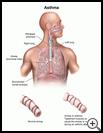
Aspirin-Induced Asthma
________________________________________________________________________
KEY POINTS
- Asthma is a lung disease that causes coughing, wheezing, and shortness of breath. Aspirin-induced asthma is triggered by taking aspirin, ibuprofen, naproxen, or other NSAIDs.
- Treatment may include asthma medicines that you inhale or take by mouth. Some people may be treated with a kind of therapy called aspirin desensitization. This process must be supervised by an experienced healthcare provider.
- To help prevent aspirin-induced asthma, avoid products that contain aspirin. Be sure to read labels. Several medicines contain aspirin or other NSAIDs.
________________________________________________________________________
What is aspirin-induced asthma?
Asthma is a long-lasting (chronic) lung disease. It causes coughing, wheezing, and shortness of breath.
Aspirin-induced asthma is asthma triggered by taking aspirin or other nonsteroidal anti-inflammatory drugs (NSAIDs). Aspirin, ibuprofen, and naproxen are NSAIDs.
This kind of asthma is not common in children.
What is the cause?
Asthma symptoms are caused by two different problems in the airways.
- One problem is that the muscles in the airways tighten up, which causes chest tightness and wheezing.
- The other problem is swelling, irritation, and too much mucus in the airways.
If you have asthma, symptoms often start after you are exposed to a trigger. Asthma triggers can include:
- Exercise
- Allergies, such as dust, pollen, mold, or animal fur
- Something that irritates your lungs, such as cold air, smoke, or strong smells like paint or perfume
- Medicines like aspirin or NSAIDs
- An infection such as a cold, the flu, or a sinus infection
- Strong emotions or stress
- Indigestion, also called gastroesophageal reflux disease, or GERD. If you often have problems with acid indigestion, you may have more asthma symptoms, especially at night.
What are the symptoms?
The first symptoms of aspirin-induced asthma may include sneezing, a runny or stuffy nose, and redness and warmth of the face. Symptoms start 1 to 3 hours after taking aspirin or NSAIDs. The asthma attack triggered by aspirin and NSAIDs can be life threatening. In many cases, people with aspirin-induced asthma also have nasal polyps (growths in the lining of the nose or sinuses), long-term sinus disease, and loss of the sense of smell.
Adults with asthma may not be as sensitive to aspirin as children. They may have taken aspirin or NSAIDS in the past without any side effects. Symptoms may not start until adulthood.
How is it diagnosed?
There are no blood tests or skin tests that will diagnose allergy to aspirin or NSAIDs. Your healthcare provider will ask about:
- Your use of aspirin
- How often you are having symptoms
- Any other allergies or triggers
The provider may refer you to an allergy specialist to see if you have other allergies.
How is it treated?
If you have been diagnosed with aspirin-induced asthma, do not take products that contain aspirin.
In general, aspirin-induced asthma is managed in the same way as other types of asthma. Three types of medicines are used to control asthma:
- Quick-relief medicines, also called reliever, or rescue medicines. These medicines are used as needed to treat asthma attacks. They are not used on a regular, daily basis to prevent asthma symptoms. You should learn to recognize the symptoms of an asthma attack and take these medicines as soon as symptoms start. To prevent asthma attacks, you may need a different type of medicine called a controller.
- Long-term control medicines, also called controller medicines. By taking this medicine regularly every day, it helps to control your symptoms. You will take these medicines every day, even if you are not having symptoms. They do not provide quick relief of wheezing in acute asthma attacks.
- Steroid medicines, also called asthma controller medicines, because by taking them regularly every day, they help to control your symptoms. You will take these medicines every day, even if you are not having symptoms. They do not provide quick relief of wheezing in acute asthma attacks. Steroid medicines are similar to hormones made by your body. They block some of the chemicals that cause irritation and swelling in your airways. By lessening the swelling, you will have fewer symptoms and be able to breathe better.
Some people may be treated with a kind of therapy called aspirin desensitization. You start by taking a very small dose of aspirin in a medical setting where there is emergency support. This process must be supervised by an experienced healthcare provider. Do not try this alone. The dose is carefully and gradually increased until a normal dose of aspirin can be taken without causing symptoms. As the dose is increased, there is a chance of a sudden asthma attack. Once you are able to take a normal dose of aspirin without having symptoms, you will keep taking that dose every day. As this happens, your symptoms will decrease. This can reduce the need for asthma medicines and improve asthma control.
It’s a good idea to wear some form of ID (such as a Medic Alert bracelet) that says that you have aspirin-induced asthma. If you need emergency care, surgery, or lab tests, this helps the healthcare provider know how to treat you.
Can it be prevented?
Aspirin-induced asthma can be prevented. Avoid products that contain aspirin. Be sure to read labels. Several medicines contain aspirin or other NSAIDs.
Do not give aspirin to children 18 years or younger unless told to do so by your healthcare provider. This is due to the risk of Reye's syndrome (an illness that causes inflammation of the brain and liver).
If you have asthma, use NSAIDs such as ibuprofen with caution. If you have asthma and nasal polyps, do not use NSAIDs without the approval of your healthcare provider.
In rare cases, acetaminophen may also trigger an asthma attack. Reactions are usually less intense than reactions to aspirin or other NSAIDS. Acetaminophen is the medicine most often used for fever and pain relief for people who cannot take aspirin and NSAIDs.

